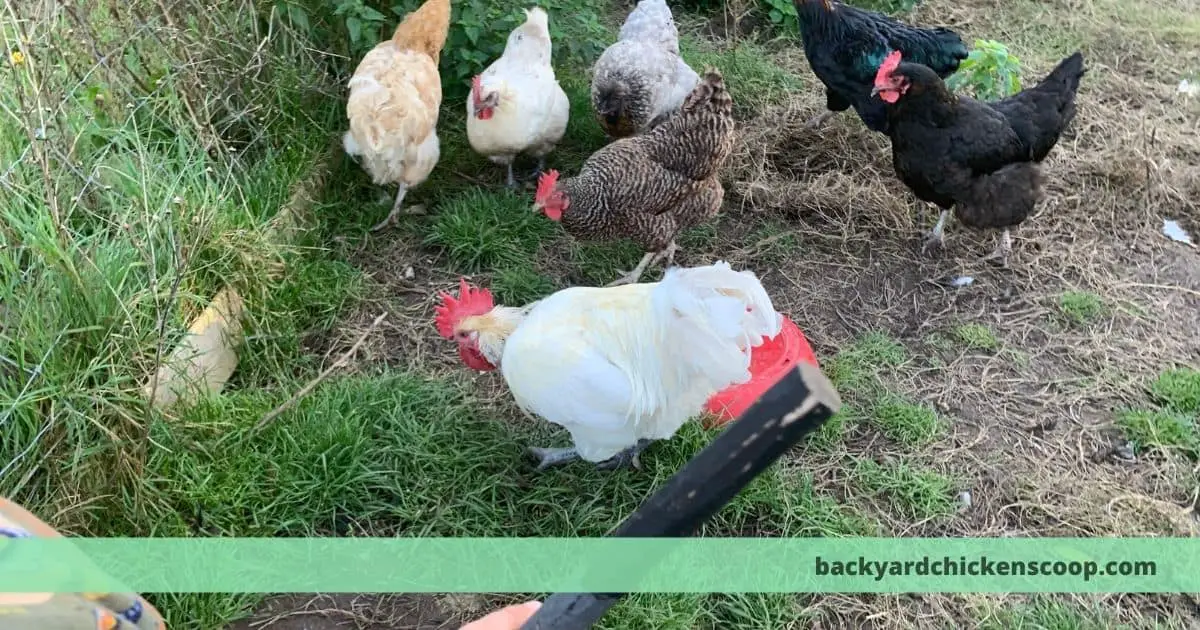Why would a healthy chicken suddenly die? It died overnight with no symptoms… But is it common for chickens to die suddenly? It can be incredibly puzzling and disheartening to find a seemingly healthy backyard chicken suddenly deceased, especially when there were no noticeable symptoms prior to its passing.
As a chicken owner, it’s natural to question why this happened and what steps can be taken to prevent such unexpected losses in the future. In this article, I will be looking at how you stop chickens from dying and what to do when your chickens are dying.
Key Takeaways
- Decrease in egg production and the onset of illness or disease are common indicators that chickens may be dying.
- Investigating potential causes such as diseases, parasites, and environmental factors is essential to prevent further losses.
- Individual chicken deaths can be caused by contagious diseases, predation, parasites, stress, or nutritional issues and should be addressed promptly.
- Multiple sudden chicken deaths require immediate investigation to identify and address the underlying cause to prevent further losses.
- Factors such as natural causes, stress, bad feeding and management practices, viruses and diseases, and injuries can contribute to sudden chicken deaths and should be addressed to ensure the health and well-being of the flock.
| Topic | Main Points | Details to Look For |
|---|---|---|
| Signs of Dying Chickens | Noticeable changes in behaviour or activity levels Signs of aggression or pecking order disturbances The presence of predators or excessive noise | Decreased egg production Illness or disease symptoms Laboured breathing, weight loss, or changes in appearance |
| Causes of Sudden Chicken Deaths | Disease and infections Predation, parasites, stress Nutritional issues | External injuries or signs of predator attacks Presence of parasites like mites or lice Signs of stress, such as feather picking or aggression |
| Multiple Chickens Dying | An outbreak of contagious diseases Toxicity or poisoning Issues with feed or water Adverse environmental conditions Predation | Increased mortality within a short period Unusual behaviour or symptoms in multiple birds Abnormalities in feed or water quality Evidence of predator attacks |
| Natural Causes | Chickens don’t die of old age, but from diseases that become more common as they age | Progressive decline in health and overall condition |
| Can You Eat Animals That Die of Old Age? | Depends on the cause of death; if from natural causes like weather or organ failure, it may be safe to consume | Check for signs of disease or infection Assess the circumstances surrounding the death Consult with a veterinarian if uncertain |
| Bad Feeding and Management | Inadequate food and water Incorrect feed type Overcrowding | Insufficient food or water available Incorrect feed formulation or improper storage Overcrowded living conditions |
| Chickens Dying from Stress | Stress weakens the immune system Stressors include environmental changes, overcrowding, predators, and disease organisms | Noticeable changes in behaviour or activity levels Signs of aggression or pecking order disturbances Presence of predators or excessive noise |
| Pen and Litter Management | Clean and replace litter regularly Provide sufficient space and ventilation Regularly inspect for signs of disease | Respiratory symptoms like sneezing, coughing, or nasal discharge<br>- Diarrhea or changes in faecal consistency<br>- Decreased appetite or lethargy |
| Viruses and Disease | Viral infections can cause sudden chicken deaths Proper biosecurity measures, cleaning, disinfection, and vaccination can help prevent disease | Respiratory symptoms like sneezing, coughing, or nasal discharge Diarrhoea or changes in faecal consistency Decreased appetite or lethargy |
| Newcastle Disease | Highly contagious respiratory disease Strict biosecurity measures, quarantine, and vaccination are key prevention measures | Respiratory distress, such as coughing, gasping, or gurgling sounds Swollen or discoloured eyes or wattles Sudden death without prior signs of illness |
| Infectious Bronchitis | Highly contagious viral respiratory disease Quarantine, supportive care, and boosting the immune system are important | Respiratory symptoms, including coughing, sneezing, or nasal discharge Reduced egg production or poor egg quality Lethargy or depression |
| Egg-Bound Hen | Decreased egg production Illness or disease symptoms Laboured breathing, weight loss, or changes in appearance | Swelling or visible egg in the vent area, hen straining or looking uncomfortable, walking like a penguin, or lethargy |
How do you know when chickens are dying?
When chickens start to die, there are usually some telltale signs that let me know. In my experience, one of the most common indicators is a decrease in egg production. If my hens used to lay two or three eggs per day and then suddenly stop laying altogether, that’s usually when I start to worry.
Another sign that backyard chickens may be dying is if they start to come down with an illness or disease like Marek’s Disease or Avian Influenza. This can be fatal for birds, so it’s important to keep a close eye on them and take immediate action if this occurs.
Lastly, physical symptoms like laboured breathing, weight loss or changes in their appearance can also alert me to the fact that chickens are dying.
And then “sudden death” is not so sudden after all.
Ad: I thought you’d like these…
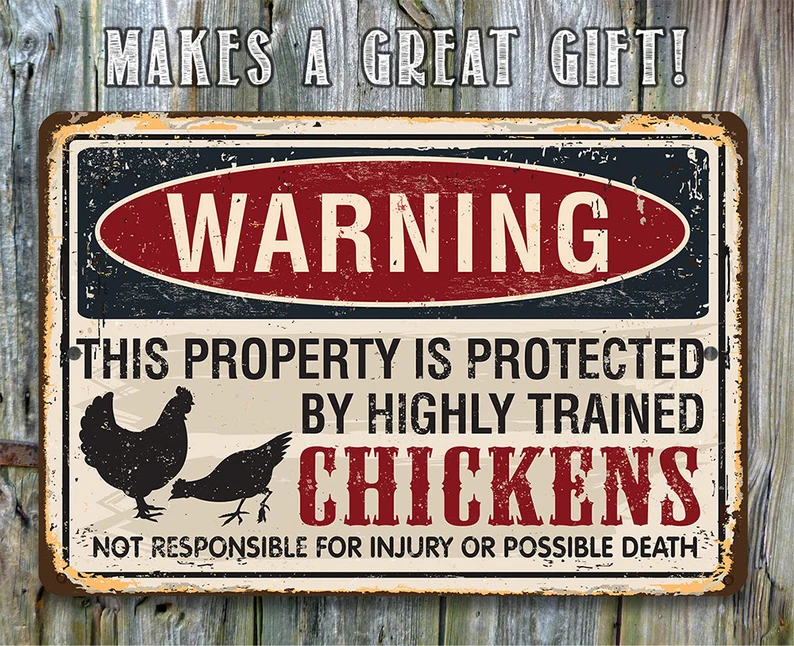

Causes of death in chickens: Sudden chicken death syndrome
- One of my chickens died, A young chicken died suddenly
Losing young birds suddenly can be distressing, and it’s important to understand why chickens can experience unexpected deaths. There could be various reasons behind sudden chicken deaths, and it’s essential to investigate the potential causes to prevent further losses.
One common cause of sudden chicken deaths is disease. Chickens can be susceptible to various infections and illnesses, such as respiratory diseases, parasites, or viral infections. It’s crucial to monitor your flock for any signs of illness, such as respiratory symptoms such as coughing, sneezing, diarrhoea, or lethargy. If you notice any abnormalities, consult a veterinarian with poultry expertise to get a proper diagnosis and appropriate treatment options.
- Why are my chickens dying one at a time?
If you’re experiencing a situation where your backyard chickens dying one at a time, it’s crucial to act swiftly. Individual chicken deaths can stem from various factors, including contagious diseases, predation, parasites, stress, or nutritional issues. Consult a veterinarian to rule out diseases and implement appropriate treatment.
Secure your coop against predators, monitor for signs of parasites, address any bullying within the flock, and ensure meat birds have a balanced diet for optimal nutrition. Identifying and addressing the specific cause behind the individual deaths will help safeguard the overall health of your chickens.
- Multiple chickens died suddenly
Experiencing multiple sudden chicken deaths is a cause for immediate concern and warrants careful investigation to identify the underlying cause and prevent further losses.
Several factors could contribute to this situation, including the outbreak of contagious diseases within the flock, potential toxicity or poisoning from substances in the environment, issues with the poultry feed, or water quality, adverse environmental conditions, or predation by predators.
Natural Causes
I asked our veterinarian if my chicken where dying of old age, and what she told me was actually surprising to me. Contrary to common belief chickens don’t die of old age. They tend to get sick more the older they get, and they then die from the disease – not the age itself.
Chickens dying is a sad and unfortunate occurrence in many people’s lives. I’ve had my own share of experiences with chickens that have suddenly died for seemingly no reason, which often left me feeling frustrated and helpless.
In my experience, backyard chickens can die due to natural causes like disease, extreme weather conditions, or disease. Older chickens are particularly susceptible to falling ill as their immune system begins to weaken over time.
Exposure to contaminated feed or water sources. Furthermore, even in ideal weather conditions, birds may still suffer from dehydration due to lack of access to clean drinking water or excessive heat stroke on hot summer days that lead them astray from finding shade or cooling off in a nearby pool of water.
Can you eat animals that die of old age?
That leads me to my next question for our veterinarian: Can you eat a chicken that died of natural causes? And again her answer surprised me …what seems to be natural causes might not be.
If the natural cause is the weather, dehydration, heart attack, or simply a failing organ eating the chicken could be perfectly fine. If the natural is an infection, cancer or something contagious, eating that chicken could be dangerous or disgusting at the very least.
The answer here depends on when the chicken was found dead; if it was hours after death then it may be safe to consume, however, if it was days after death then consuming the chicken could result in food poisoning or other serious health issues.
You also need to know…
Essentials
Bad feeding and Management
Bad feeding and management of my chickens is an issue that I have recently become more aware of. My family has always kept chickens, but it wasn’t until recently that we started to have serious issues with the health and welfare of our birds. We began to notice that chickens were dying without any obvious cause, which prompted us to take a closer look at our management practices.
It turns out we had been inadvertently doing things wrong: Not providing enough food or allowing them access to fresh water, using the wrong type of feed, and overcrowding the coop were all contributing factors.
I felt really bad for not realizing these mistakes sooner; if I had paid better attention I could have prevented some of the deaths by making sure they were properly taken care of.
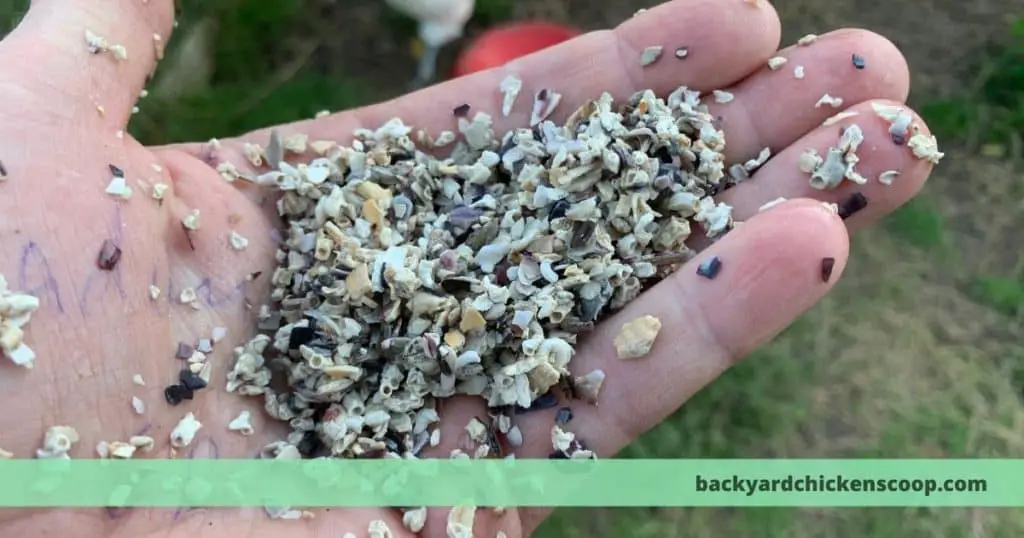
Can chickens die from stress?
Chickens are sensitive animals, and excessive stress can have detrimental effects on their health and overall well-being. Stressors such as sudden changes in their environment, overcrowding, loud noises, predation, disease organisms or harassment from other animals can lead to significant stress in chickens.
When chickens experience stress, their immune system can weaken, making them more susceptible to diseases and infections.
Additionally, stress can disrupt their feeding and drinking patterns, leading to dehydration and malnutrition. Chickens may also exhibit abnormal behaviours like feather pecking, cannibalism, or self-mutilation when they are under significant stress.
To prevent stress-related health issues in chickens, it’s essential to provide them with a calm and suitable environment. Ensure they have enough space in their coop or run, protect them from predators, maintain a consistent daily routine, and minimize sudden changes in their surroundings. Offering a balanced diet, access to fresh water, and opportunities for exercise and socialization can also help reduce stress levels in chickens.
Pen and Litter Management in poultry
I do need to say this upfront. Otherwise, I might not actually be helping you. But the reason why your chickens are dying could actually be you.
Proper pen and litter management are crucial for maintaining the health and well-being of poultry, including chickens. Neglecting these aspects can have serious consequences, and it’s important to address them to prevent adverse outcomes for your chickens.
Litter management involves maintaining a clean and suitable bedding material in the chicken coop or pen. The litter serves multiple purposes, including absorbing moisture, providing insulation, and promoting good hygiene. If the litter is not regularly cleaned or replaced, it can become wet, dirty, and contaminated with faeces, feed spillage, and other waste materials.
This creates an unsanitary environment that can harbour bacteria, parasites, and pathogens harmful to chickens. Diseases like coccidiosis, respiratory infections, and footpad dermatitis can thrive in such conditions, leading to increased mortality and bacterial disease rates among the flock.
Similarly, pen management refers to the overall organization and maintenance of the chicken enclosure. Overcrowding, poor ventilation, and inadequate space can contribute to stress and disease transmission among chickens.
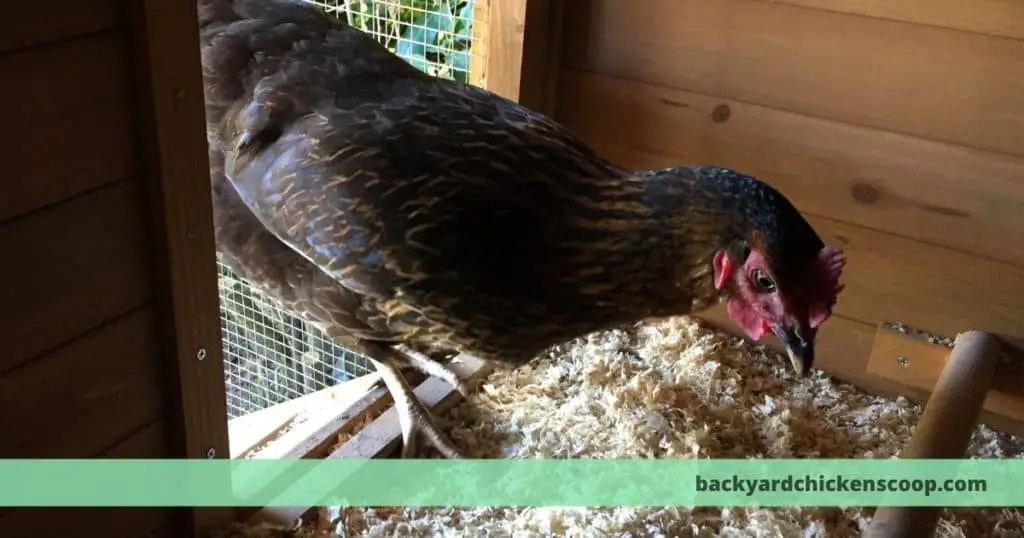
Insufficient space restricts their movement, causes aggression and pecking order issues, and increases the risk of injuries. Inadequate ventilation can lead to high humidity, ammonia build-up, and poor air quality, which can negatively affect the respiratory health of chickens.
To ensure proper pen and litter management, it is important to follow some guidelines. Regularly clean and replace the litter to maintain dryness and hygiene. Provide sufficient space for the number of chickens you have, allowing them to move around comfortably.
Adequate ventilation should be ensured, allowing fresh air circulation and minimizing humidity and ammonia levels. Additionally, regular inspection for signs of disease, such as diarrhoea, respiratory distress, or skin lesions, can help detect potential issues early and prevent further spread.
Viruses and Disease
When chickens are dying unexpectedly, viruses and diseases often lie at the heart of the matter. These invisible villains can wreak havoc on the health of our feathered friends, causing devastating consequences if left unchecked. That’s why understanding the role viruses and diseases play in sudden chicken deaths is crucial for any dedicated chicken keeper.
Viruses and diseases affecting chickens come in various forms, from respiratory infections to gastrointestinal disturbances. Some common culprits include avian influenza, Newcastle disease, infectious bronchitis, and Marek’s disease, to name just a few.
These nefarious entities can be introduced to your flock through wild birds, contaminated feed or water, or even by unwittingly bringing them home from poultry shows or other farms. Once they infiltrate your chicken coop, they can spread rapidly, causing illness and, unfortunately, sometimes death.
So, how can we protect our precious chickens from these invisible threats? Prevention is key! Implementing proper biosecurity measures is essential. Start by ensuring a clean and sanitary living environment for your flock. Regularly clean and disinfect their coop, waterers, and feeders. Limit exposure to potential carriers of diseases, such as wild birds or rodents.
Quarantine new birds before introducing them to the rest of the flock, and monitor their health closely. Vaccinations are also a valuable tool in defending against specific diseases. Consult with your veterinarian to determine the best vaccination program for your flock.
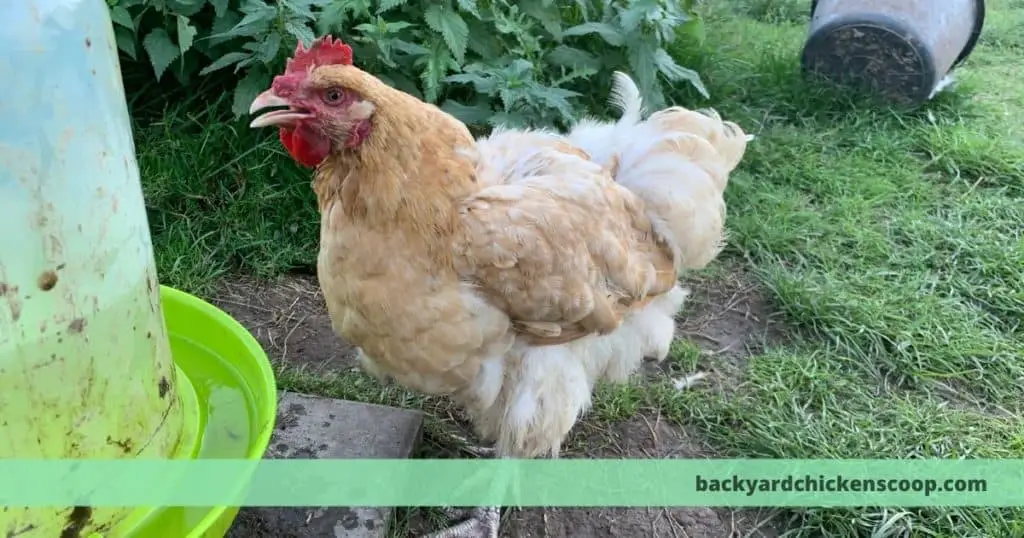
Newcastle disease
Newcastle disease, also known as avian paramyxovirus, is highly contagious among chickens and other avian species. It spreads through direct contact with infected birds, contaminated equipment, or even airborne transmission.
The symptoms can vary, but keep an eye out for signs like respiratory distress, decreased egg production, diarrhoea, and, of course, sudden and unexplained deaths. It’s heartbreaking to witness your flock suffer, but don’t fret just yet chicken owners. There are steps you can take to protect your chickens and prevent the spread of the disease.
First and foremost, ensure strict biosecurity measures. Limit access to your flock and always wash your hands, change your clothing, and disinfect your shoes before entering their living area. Quarantine any new birds before introducing them to your existing flock.
Regularly clean and disinfect the coop, equipment, and water sources to reduce the risk of contamination. Proper vaccination is also a key defence against Newcastle disease. Consult with your veterinarian to develop a vaccination schedule tailored to your flock’s specific needs.
If you are seeing swollen areas and black spots on the chicken combs you should also read about the reasons here…
Infectious Bronchitis
Infectious Bronchitis, or IB for short, is a viral respiratory disease that can hit our flocks like an unexpected gust of wind. It spreads rapidly through respiratory secretions, and before you know it, one sick chicken can turn into a full-blown epidemic among the flock. The symptoms are unmistakable: sneezing, coughing, nasal discharge, and a general decline in egg production (our precious breakfast supply!).
As a chicken parent myself, I’ve seen firsthand how distressing it can be to deal with young chicks with IB. But fear not, because knowledge is power, and we can take steps to protect our feathered companions. Quarantine is our best friend when we suspect an outbreak. Isolate the sick chickens from the healthy ones to prevent the disease from spreading like wildfire through the coop.
While there’s no cure for IB, supportive care is essential to help our chickens fight off the virus. Ensure they have access to clean water, balanced nutrition, and a cosy, stress-free environment. Boosting their immune systems can make a clucking difference!
Egg-Bound Hen: Stuck Egg
Egg-bound is when an egg gets stuck somewhere along the hen’s reproductive tract, preventing it from being laid naturally. This condition can occur due to various reasons, including genetics, nutritional imbalances, or even stress. And yes, stress can indeed play a part in this unfortunate scenario. Remember, a happy and relaxed hen is a healthy hen!
Spotting an egg-bound hen can be challenging, but some telltale signs might give you a clue. Keep an eye out for your hen spending an unusually long time in the nesting box, straining or squatting excessively, or even showing signs of pain or distress.
Sometimes, you may notice a bulge near the vent or see your feathered friend producing watery droppings. If you suspect your hen might be egg-bound, don’t panic! There are steps you can take to help.
First things first, create a calm and stress-free environment for your hen. Provide her with a quiet and comfortable nesting area, away from any disturbances or potential predators. A gentle massage or a warm bath may also help relax her muscles and potentially aid in the egg’s passage. If you’re comfortable doing so, you can carefully lubricate the vent with a water-soluble lubricant or even try inserting a gloved finger to gently feel for the egg. However, it’s crucial to be extremely gentle to avoid causing harm.
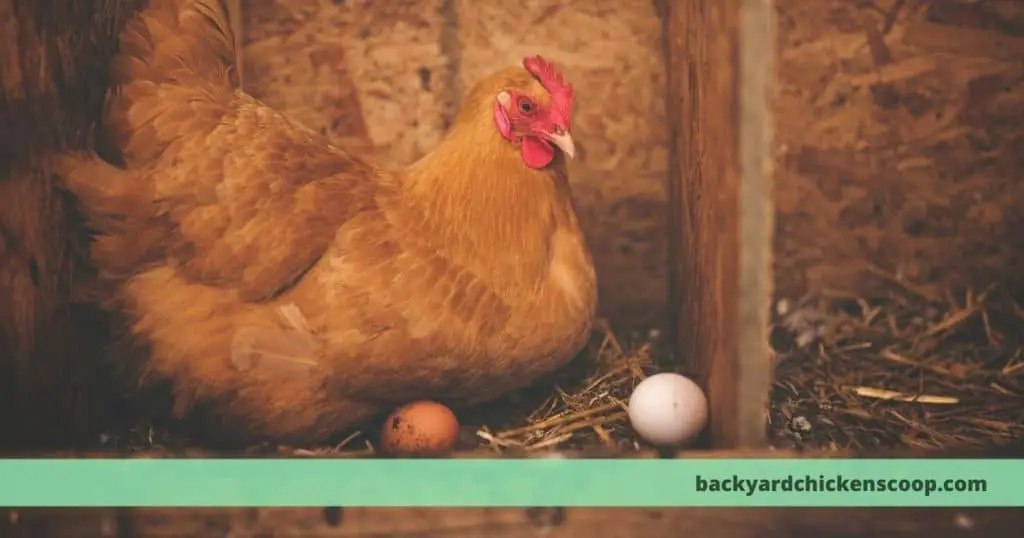
External and Internal Injuries
External and internal injuries can be significant factors contributing to the sudden death of chickens. While it can be heartbreaking and frustrating to witness, understanding the potential causes of these injuries is essential for preventing future losses in your flock.
External injuries, such as wounds from predator attacks or accidents, can lead to infections and other complications if left untreated. Internal injuries, on the other hand, may be caused by dietary issues, egg binding, or trauma from rough handling or aggressive behaviour among chickens.
Regularly inspecting your chickens for signs of injury and providing appropriate veterinary care can help identify and address these issues promptly, improving their chances of survival.
Crop Impaction
Crop impaction, a common issue among chickens, could be a reason behind sudden deaths. The crop is a part of the chicken’s digestive system responsible for storing and moistening food before it reaches the stomach.
The cause of crop impaction in chickens can vary, but it is typically related to issues with their feeding habits or diet. Some common causes include:
- Overeating: Chickens have a tendency to overeat, especially if they have access to an abundant food source. Consuming excessive amounts of food can overwhelm the crop’s capacity, leading to impaction.
- Eating large or sharp objects: Chickens are curious creatures and may accidentally ingest objects that are too large or have sharp edges. These objects can get stuck in the crop, causing blockage.
- Poor dietary choices: Offering inappropriate or poorly balanced diets can contribute to crop impaction. Feeding chickens food that is too dry, lacking in fibre, or containing large particles can hinder the passage of food through the crop.
- Dehydration: Inadequate water intake can result in dry food in the crop, making it more difficult to pass through and increasing the risk of impaction.
When a chicken’s crop becomes impacted, it means that food is not properly passing through, causing a blockage. This can result from overeating, consuming large or sharp objects, or even poor dietary choices. If your chickens are suddenly dying, crop impaction could be a potential culprit.
Keep an eye out for symptoms like swelling or discomfort around the crop area and regurgitation. Prompt veterinary attention is crucial for diagnosing and treating this condition to save your flock.
Heart Attack
Heart attacks can be a surprising cause of sudden chicken deaths. While it may seem unusual, chickens, like humans, can experience heart-related issues. Stress, obesity, or underlying heart conditions can increase the risk of heart attacks in chickens. It’s important to provide a low-stress environment and a balanced diet to support their cardiovascular health.
If your chickens are suddenly dying, it’s worth considering heart attacks as a potential cause. Watch out for signs like sudden death without any prior symptoms, laboured breathing, or weakness. Consulting with a veterinarian can help determine if a heart condition is a culprit and guide you in preventive measures to support your flock’s heart health.
Can chickens be scared to death and die of fright?
While it is rare for chickens to die directly from fright, extreme fear or stress can have detrimental effects on their health and well-being. Chickens are sensitive animals, and intense or prolonged periods of fear can lead to a range of physiological responses that can be harmful.
When chickens experience extreme fear, their bodies release stress hormones such as adrenaline and cortisol. These hormones can cause a rapid increase in heart rate, blood pressure, and respiration, putting strain on the cardiovascular system.
Additionally, high levels of stress hormones can suppress the immune system, making chickens more susceptible to diseases and infections.
While it is unlikely that a single frightful event will directly cause a chicken’s death, persistent fear or chronic stress can have cumulative negative effects on their overall health and can contribute to a weakened immune system, making them more vulnerable to illnesses that could potentially be fatal.
Ad: I thought you’d like these…


Parasites (external and internal)
Parasites can be a sneaky culprit behind sudden chicken deaths. Both external and internal parasites can wreak havoc on your flock’s health. External parasites like mites and lice can cause intense itching, feather loss, anaemia, and even transmit diseases.
Parasites that can affect chickens and potentially contribute to sudden deaths, there are several important ones to consider. Here are some relevant parasites:
- External Parasites:
- Mites: Common poultry mites like red mites and northern fowl mites can infest chickens, causing irritation, feather loss, anaemia, and stress.
- Lice: Chicken lice feed on feathers and skin, leading to feather damage, skin irritation, and anaemia if left untreated.
- Internal Parasites:
- Worms: Various types of worms, including roundworms, tapeworms, and gapeworms, can infect chickens’ digestive systems. Heavy worm burdens can cause poor growth, decreased egg production, weakness, and even death if left untreated.
- Protozoa:
- Coccidia: Coccidiosis is a common protozoan infection in chickens. It affects the gut and can cause diarrhoea, weight loss, reduced appetite, and even death, particularly in young birds or immunocompromised birds.
These are just a few examples of parasites that can impact the health and well-being of chickens, potentially leading to sudden deaths.
Regularly inspect your chickens for signs of infestation, such as irritated skin or feather damage. Internal parasites like worms can lead to poor growth, decreased egg production, and weakened immune systems. Implement a deworming program and provide a clean environment to keep these pesky critters at bay.
Chicken having seizures and sudden death
So why did my chicken have a seizure and die? Seizures in chickens can be caused by factors such as infections, nutritional deficiencies, toxins, or genetic abnormalities.
Understanding the reasons behind chickens dying unexpectedly is crucial to protect the health of your flock. While seizures can be a symptom of an underlying problem, other factors contributing to chickens dying can include diseases, parasites, stress, poor nutrition, or inadequate housing conditions.
Common causes for seizures in chickens:
- Newcastle Disease: This highly contagious viral infection can cause neurological symptoms, including seizures, in chickens. It is a significant concern in poultry populations worldwide.
- Avian Encephalomyelitis: This viral disease affects the nervous system of chickens and can lead to seizures, tremors, and paralysis. It is typically transmitted through infected eggs or faecal matter.
- Marek’s Disease: Another viral infection, Marek’s Disease, can cause tumours in the nerves and organs of chickens. Seizures may occur as a result of the nervous system being affected.
- Lead or Heavy Metal Toxicity: Ingestion of lead or other heavy metals can lead to neurological symptoms, including seizures, in chickens. This can happen if they consume contaminated feed, water, or objects within their environment.
- Vitamin Deficiencies: Deficiencies in certain vitamins, such as vitamin E or vitamin B, can affect the nervous system of chickens and contribute to seizures. Balanced nutrition is crucial to prevent such deficiencies.
- Heat Stress: High temperatures and inadequate ventilation can cause heat stress in chickens, leading to seizures and other heat-related issues. Providing proper cooling and ventilation in hot weather is essential.
- Brain Injury or Trauma: Head injuries or trauma can result in seizures in chickens. This can occur due to accidents, falls, or encounters with predators or other animals.
- Genetic Abnormalities: Some genetic conditions can make chickens more prone to seizures. Breeding from healthy stock and avoiding breeding birds with known genetic issues can help reduce the risk.
It’s important to note that this is not an exhaustive list, and seizures in chickens can have various other causes.
FAQ
Is it common for chickens to die?
Chickens, like any living being, are susceptible to illness, injuries, and natural mortality. While it is common for chickens to die at certain stages of their lives, such as old age or due to natural causes, the frequency of deaths can vary depending on several factors.
Good husbandry practices, including proper nutrition, adequate shelter, disease prevention, and predator control, can significantly reduce the mortality rate among chickens. Regular veterinary care and proactive monitoring can help identify and address potential health issues, further promoting the overall well-being and longevity of the flock.
Do chickens mourn dead chickens?
Chickens do exhibit behavioural changes and responses when a flock member dies. While it is difficult to determine if chickens mourn in the same way humans do, they do show signs of distress and a recognition of the loss. Chickens may become quieter, exhibit changes in eating and drinking patterns, and may even search for the deceased chicken.
Some chickens may show signs of social withdrawal or increased vigilance after the loss of a flock member. It is important to provide a supportive environment during this time, ensuring that the remaining chickens have companionship and access to food, water, and secure space.

